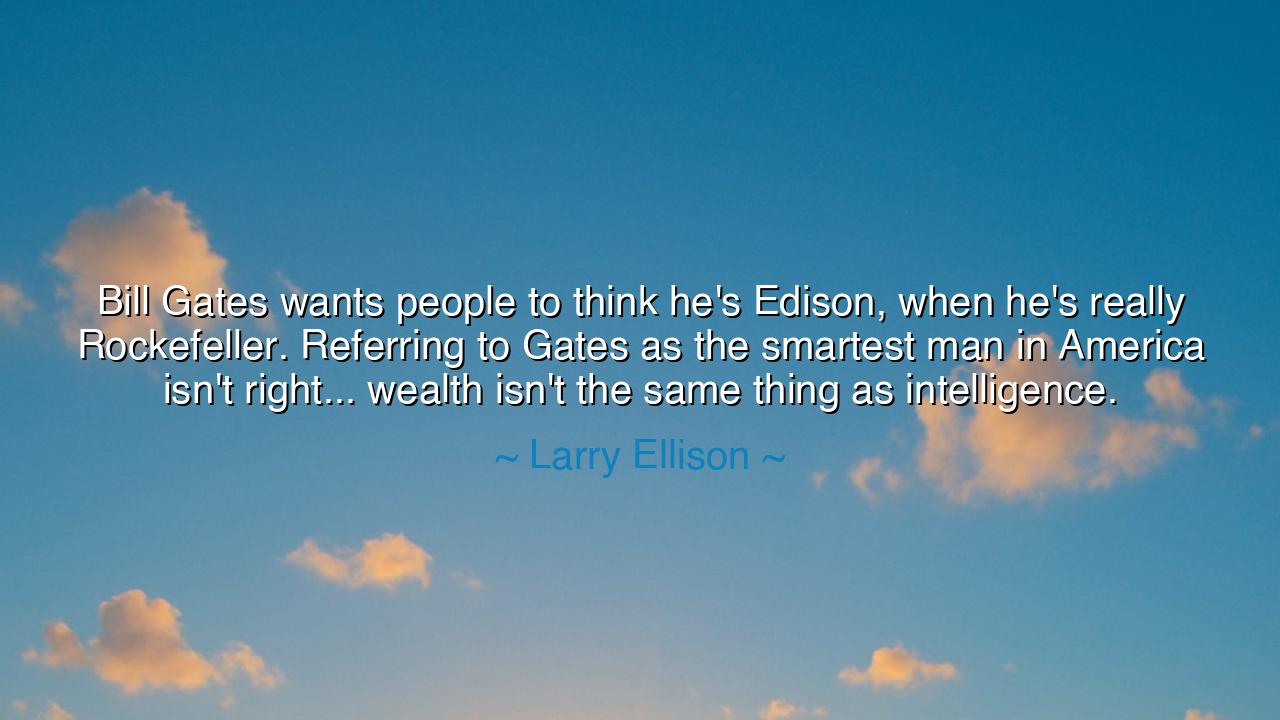
Bill Gates wants people to think he's Edison, when he's really
Bill Gates wants people to think he's Edison, when he's really Rockefeller. Referring to Gates as the smartest man in America isn't right... wealth isn't the same thing as intelligence.






The words of Larry Ellison, a titan of his own making, strike with the force of thunder and the depth of reflection: “Bill Gates wants people to think he's Edison, when he's really Rockefeller. Referring to Gates as the smartest man in America isn't right... wealth isn't the same thing as intelligence.” Beneath these words lies a timeless struggle — between invention and empire, between genius and ambition, between creation and accumulation. Ellison’s statement is not merely a critique of a man, but a warning to the world: to discern the difference between the mind that builds and the hand that conquers, between those who create light and those who gather power.
In this comparison, Edison represents the inventor, the one who toils in darkness to bring forth the spark of discovery. He is the dreamer whose vision burns so fiercely that he births entire worlds from imagination. Rockefeller, on the other hand, symbolizes control, the empire-builder, the one who bends systems to his will. Where Edison created the light, Rockefeller bought the oil that fueled it. Both were men of brilliance, but their brilliance took different forms — one born of curiosity, the other of dominance. Ellison, in naming Bill Gates not as Edison but as Rockefeller, draws a line between innovation and influence, suggesting that the latter may mask itself as the former in the eyes of the world.
This truth is as old as civilization. In every age, there are those who invent and those who capitalize upon invention. The philosophers of Athens sought wisdom for its own sake, while the rulers of empires turned that wisdom into tools of governance and control. In the Renaissance, Leonardo da Vinci envisioned the flying machine, but it was the merchants and kings who reaped the wealth of his era. The same pattern repeats in our modern age, where the visionary’s flame is often overshadowed by the magnate’s shadow. Ellison’s words remind us that wealth, though powerful, is not the ultimate proof of wisdom.
Yet, there is no malice in recognizing the distinction. For both types of greatness — the Edison and the Rockefeller — serve the unfolding of history. One brings the idea into being; the other brings it into the world. But confusion arises when the latter claims the mantle of the former — when power masquerades as genius, and fortune is mistaken for intellect. It is this illusion that Ellison seeks to shatter, urging us to see beyond gold and fame, to honor the quiet labor of true thought and creativity.
The story of Nikola Tesla stands as a beacon of this truth. While Edison and others built empires, Tesla pursued pure invention, often in poverty and isolation. He dreamed of free energy for all mankind, a vision too grand for the merchants of his time. The world remembers him now as a prophet of electricity, but in his life, he was overshadowed by those who turned his brilliance into wealth. His tale mirrors Ellison’s warning — that intelligence and wealth are not twins, but distant cousins. The world too often crowns the richest as the wisest, forgetting the countless thinkers who changed it without riches or renown.
The lesson, then, is one of discernment and humility. Measure greatness not by the size of one’s fortune, but by the depth of one’s contribution. Seek not to be the richest, but to be the most authentic in your craft. The mind that invents, the heart that dreams, and the spirit that serves — these are the true treasures of intelligence. For intelligence, in its highest form, is not the cunning to dominate, but the wisdom to illuminate — to bring light where there was none, and to uplift others rather than merely oneself.
To live by this truth is to walk the path of the true creator. Cultivate your mind as a forge, not a market. Let your ideas be your legacy, not your wealth. Build not for applause, but for purpose. And when the world tempts you to measure your worth by what you own, remember Ellison’s words — “wealth isn’t the same thing as intelligence.” For when your name is long forgotten in ledgers and bank vaults, your ideas, if pure and brave, will still live in the hearts of those who dream.
Thus, let this teaching be carved into the memory of time: Be as Edison, not for the praise of men, but for the joy of discovery. Be as Rockefeller only if your empire serves the good of others, not your vanity. But above all, be yourself — a mind alive with wonder, a heart lit with integrity. For in the final reckoning, it is not the wealth you leave behind that defines you, but the light you kindle in others.






AAdministratorAdministrator
Welcome, honored guests. Please leave a comment, we will respond soon